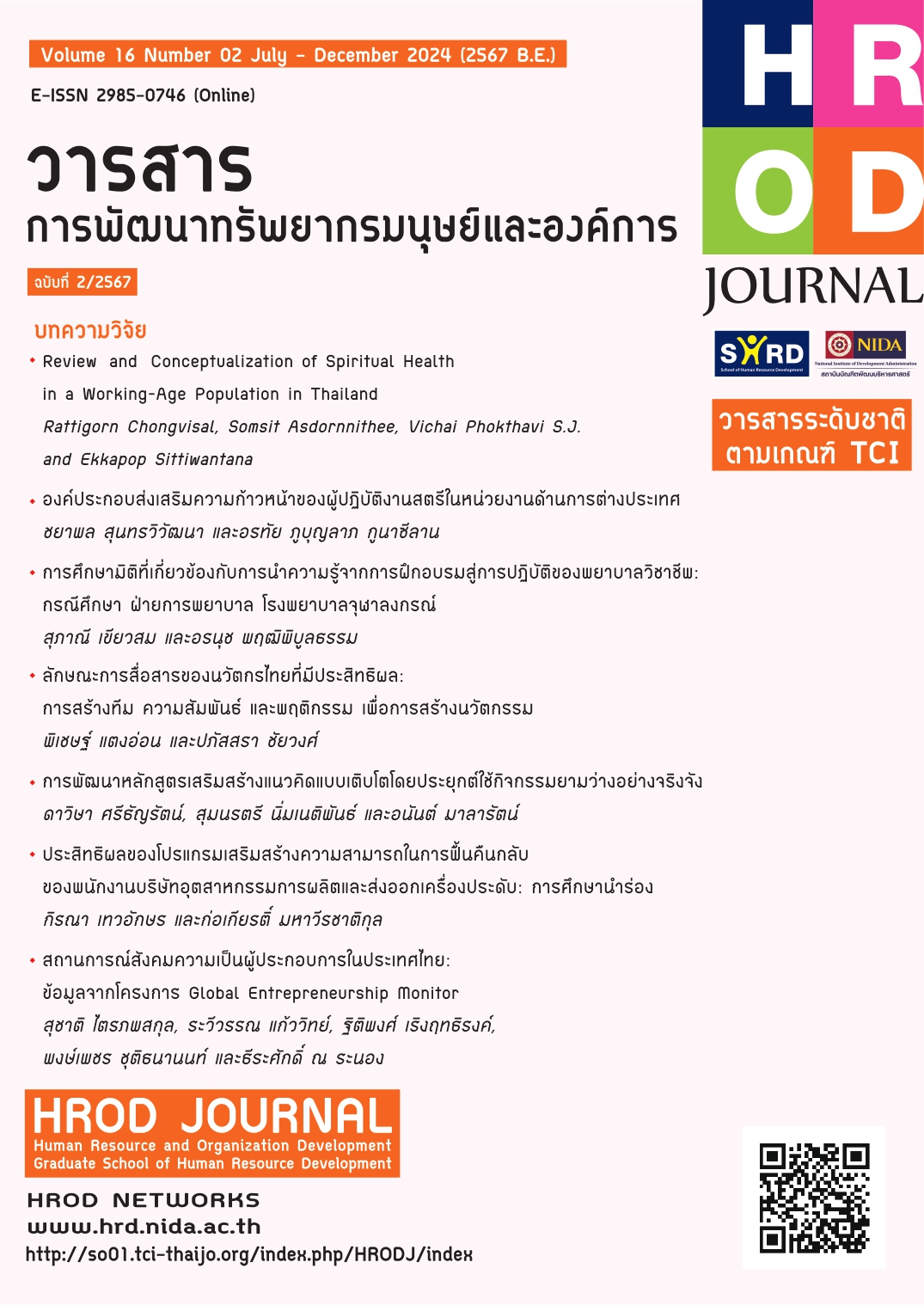สถานการณ์สังคมความเป็นผู้ประกอบการในประเทศไทย: ข้อมูลจากโครงการ Global Entrepreneurship Monitor
Main Article Content
บทคัดย่อ
การวิจัยครั้งนี้มีวัตถุประสงค์เพื่อการศึกษาระดับสังคมความเป็นผู้ประกอบการของประเทศไทย โดยอาศัยข้อมูลจากโครงการศึกษาสังคมความเป็นผู้ประกอบการระดับโลก (Global entrepreneurship monitor: GEM) ในปี 2567 จากการสัมภาษณ์เชิงลึกผู้เชี่ยวชาญจำนวน 36 ราย จาก 9 สาขา พบว่า ปัจจัยสภาพแวดล้อมและสถาบัน (EFCs) ของประเทศไทยที่เอื้อต่อการเป็นผู้ประกอบการมากที่สุดสามอันดับแรก ได้แก่ ระบบโครงสร้างพื้นฐานภายในประเทศ ความเท่าเทียมทางสังคมและวัฒนธรรม การเปิดกว้างของตลาด ในขณะที่ปัจจัยสภาพแวดล้อมและสถาบัน (EFCs) ของประเทศไทยที่เอื้อต่อการเป็นผู้ประกอบการน้อยที่สุด ได้แก่ การถ่ายโอนความรู้เพื่อการวิจัยและพัฒนา จากการสำรวจกลุ่มตัวอย่างทั่วประเทศ (Adult population survey: APS) ประชากรไทยในวัยทำงานอายุ 18 -64 ปีที่มีส่วนร่วมกับกิจกรรมผู้ประกอบการจำนวนทั้งสิ้น 2,000 ตัวอย่าง พบว่าอัตราร้อยละกิจกรรมความเป็นผู้ประกอบการในระยะเริ่มต้น (Total early-stage entrepreneurship activity: TEA) เท่ากับ 15.5 กล่าวคือ มีประชากรไทยมีส่วนร่วมต่อกิจกรรมความเป็นผู้ประกอบการในการก่อตั้งธุรกิจใหม่ประมาณ 16 คน ต่อประชาชนชาวไทยที่มีอายุระหว่าง 18-64 ปี 100 คน เมื่อพิจารณาอัตราร้อยละ TEA จำแนกตามภูมิภาค พบว่า ภาคใต้มีอัตราร้อยละ TEA สูงสุด โดยคิดเป็นร้อยละ 18.9 ในขณะที่ เพศหญิงมีแนวโน้มที่จะมีส่วนร่วมในกิจกรรมความเป็นผู้ประกอบการในระยะเริ่มต้นมากกว่าเพศชาย โดยมีอัตรา TEA อยู่ที่ร้อยละ 16.5 เปรียบเทียบกับเพศชายที่มีอัตรา TEA อยู่ที่ร้อยละ 13.8 นอกจากนี้ ข้อมูลชี้ให้เห็นว่า กลุ่มอายุ 35-44 ปี มีอัตรา TEA สูงที่สุด อยู่ที่ร้อยละ 18.7 ซึ่งบ่งชี้ว่าคนในวัยทำงานตอนกลางมีแนวโน้มที่จะเริ่มต้นหรือเป็นเจ้าของธุรกิจใหม่มากที่สุด
Article Details

อนุญาตภายใต้เงื่อนไข Creative Commons Attribution-NonCommercial-NoDerivatives 4.0 International License.
1) เนื้อหาทั้งหมดของบทความที่ลงตีพิมพ์ในวารสารการพัฒนาทรัพยากรมนุษย์และองค์การ เจ้าของผลงานมีการคิด ค้นคว้า ทบทวนวิเคราะห์ สรุป เรียบเรียงและอ้างอิงข้อมูลโดยผู้แต่งเอง กองบรรณาธิการไม่มีส่วนร่วมรับผิดชอบ
2) บทความที่ตีพิมพ์ในวารสารนี้ ต้องไม่เคยได้รับการตีพิมพ์เผยแพร่ที่ใดมาก่อน และไม่อยู่ระหว่างการเสนอเพื่อพิจารณาตีพิมพ์ในวารสารฉบับอื่น หากตรวจพบว่า มีการตีพิมพ์ซ้ำซ้อน ถือเป็นความรับผิดชอบของผู้แต่งแต่เพียงผู้เดียวในการละเมิดลิขสิทธิ์
3) ผลงานที่ได้รับการตีพิมพ์ในวารสารวิชาการ ถือเป็นกรรมสิทธิ์ของวารสารห้ามนำข้อความทั้งหมดหรือบางส่วนไปพิมพ์ซ้ำ เว้นเสียแต่ว่าจะได้รับอนุญาตจากทางกองบรรณาธิการวารสารฯ
เอกสารอ้างอิง
สำนักงานส่งเสริมวิสาหกิจขนาดกลางและขนาดย่อม. (2566). รายงานสถานการณ์วิสาหกิจขนาดกลาง ขนาดย่อมและขนาดย่อย (MSME) ปี พ.ศ. 2566. https://bds.sme.go.th/Knowledge/Detail/16
Acemoglu, D., & Autor, D. (2012). What does human capital do? A review of Goldin and Katz's The race between education and technology. Journal of Economic Literature, 50(2), 426–463. https://doi.org/10.1257/jel.50.2.426
Acs, Z. J., & Audretsch, D. B. (Eds.). (2010). Handbook of entrepreneurship research: An interdisciplinary survey and introduction (2nd ed.). Springer. https://doi.org/10.1007/978-1-4419-1191-9
Acs, Z. J., Stam, E., Audretsch, D. B., & O'Connor, A. (2017). The lineages of the entrepreneurial ecosystem approach. Small Business Economics, 49(1), 1–10. https://doi.org/10.1007/s11187-017-9864-8
Agrawal, R., Samadhiya, A., Banaitis, A., & Kumar, A. (2024). Entrepreneurial barriers in achieving sustainable business and cultivation of innovation: A resource-based view theory perspective. Management Decision. https://doi.org/10.1108/MD-11-2023-2032
Audretsch, D. B., & Belitski, M. (2020). The role of R&D and knowledge spillovers in innovation and productivity. European Economic Review, 123, 103391. https://doi.org/10.1016/j.euroecorev.2020.103391
Barney, J. (1991). Firm resources and sustained competitive advantage. Journal of Management, 17(1), 99–120. https://doi.org/10.1177/014920639101700108
Becker, G. S. (2009). Human capital: A theoretical and empirical analysis, with special reference to education. University of Chicago Press.
Bosma, N., & Kelley, D. (2019). Global entrepreneurship monitor 2018/2019 global report. Global Entrepreneurship Research Association, London Business School. https://www.gemconsortium.org/report/gem-2018-2019-global-report
Bosma, N., Hill, S., Ionescu-Somers, A., Kelley, D., Levie, J., & Tarnawa, A. (2021). Global entrepreneurship monitor 2020/2021 global report. Global Entrepreneurship Research Association, London Business School. https://www.gemconsortium.org/report/gem-20202021-global-report
Carree, M. A., & Thurik, A. R. (2003). The impact of entrepreneurship on economic growth. In Z. J. Acs & D. B. Audretsch (Eds.), Handbook of entrepreneurship research: An interdisciplinary survey and introduction (pp. 437–471). Springer. https://doi.org/10.1007/0-387-24519-7_17
Cirera, X., & Maloney, W. F. (2017). The innovation paradox: Developing-country capabilities and the unrealized promise of technological catch-up. World Bank Publications. https://doi.org/10.1596/978-1-4648-1160-9
Comin, D., Lashkari, D., & Mestieri, M. (2019, February). Structural transformation of innovation. In 2019 Meeting Papers (Vol. 1394). Society for Economic Dynamics. http://red-files-public.s3.amazonaws.com/meetpapers/2019/paper_1394.pdf
Fritsch, M. (2017). The theory of economic development: An inquiry into profits, capital, credit, interest, and the business cycle. Regional Studies, 51(4), 654–655. https://doi.org/10.1080/00343404.2017.1278975
Galindo-Martín, M. Á., Castaño-Martínez, M. S., & Méndez-Picazo, M. T. (2021). Effects of the pandemic crisis on entrepreneurship and sustainable development. Journal of Business Research, 137, 345–353. https://doi.org/10.1016/j.jbusres.2021.08.05
Global Entrepreneurship Monitor. (2024). NES harmonization process. Global Entrepreneurship Monitor. Retrieved October 25, 2024, from https://gemconsortium.org/wiki/1171
Hanushek, E. A., & Woessmann, L. (2015). The knowledge capital of nations: Education and the economics of growth. MIT Press. https://www.jstor.org/stable/j.ctt17kk9kq
Herrington, M., & Kew, P. (2017). Global entrepreneurship monitor 2016/17 global report. Global Entrepreneurship Research Association, London Business School. https://www.gemconsortium.org/report/gem-2016-2017-global-report
Hill, S., Ionescu-Somers, A., Coduras, A., Guerrero, M., Roomi, M. A., Bosma, N., Sahasranamam, S., & Shay, J. (2022, February). Global entrepreneurship monitor 2021/2022 global report: Opportunity amid disruption. Global Entrepreneurship Research Association. https://www.gemconsortium.org/report/gem-20212022-global-report-opportunity-amid-disruption
Isenberg, D. J. (2011). The entrepreneurship ecosystem strategy as a new paradigm for economic policy: Principles for cultivating entrepreneurship. Presentation at the Institute of International and European Affairs. http://www.innovationamerica.us/images/stories/2011/The-entrepreneurship-ecosystem-strategy-for-economic-growth-policy-20110620183915.pdf
Kim, P. H., & Aldrich, H. E. (2005). Social capital and entrepreneurship. Foundations and Trends® in Entrepreneurship, 1(2), 55–104. http://dx.doi.org/10.1561/0300000002
Kelley, D., Singer, S., & Herrington, M. (2016). Global entrepreneurship monitor 2015/16 global report. Global Entrepreneurship Research Association, London Business School. https://www.gemconsortium.org/report/gem-2015-2016-global-report
Lee, K. (2013). Schumpeterian analysis of economic catch-up: Knowledge, path-creation, and the middle-income trap. Cambridge University Press. https://doi.org/10.1017/CBO9781107337244
Levie, J., & Autio, E. (2008). A theoretical grounding and test of the GEM model. Small Business Economics, 31(3), 235–263. https://doi.org/10.1007/s11187-008-9136-8
Lin, J. Y. (2012). New structural economics: A framework for rethinking development and policy. World Bank Publications. https://hdl.handle.net/10986/19919
Marvel, M. R., Davis, J. L., & Sproul, C. R. (2016). Human capital and entrepreneurship research: A critical review and future directions. Entrepreneurship Theory and Practice, 40(3), 599–626. https://doi.org/10.1111/etap.12136
Naude, W. (2010). Entrepreneurship, developing countries, and development economics: New approaches and insights. Small Business Economics, 34(1), 1–12. https://doi.org/10.1007/s11187-009-9198-2
Pita, M., Costa, J., & Moreira, A. C. (2021). Unveiling entrepreneurial ecosystems’ transformation: A GEM-based portrait. Economies, 9(4), Article 186. https://doi.org/10.3390/economies9040186
Ratten, V. (2020). Coronavirus (COVID-19) and entrepreneurship: Changing life and work landscape. Journal of Small Business & Entrepreneurship, 32(5), 503–516. https://doi.org/10.1080/08276331.2020.1790167
Reynolds, P., Bosma, N., Autio, E., Hunt, S., De Bono, N., Servais, I., Lopez-Garcia, P., & Chin, N. (2005). Global entrepreneurship monitor: Data collection design and implementation 1998–2003. Small Business Economics, 24(3), 205–231. https://doi.org/10.1007/s11187-005-1980-1
Rodrik, D. (2016). Premature deindustrialization. Journal of Economic Growth, 21(1), 1–33. https://doi.org/10.1007/s10887-015-9122-3
Rodrik, D. (2018). New technologies, global value chains, and developing economies (No. w25164). National Bureau of Economic Research. https://doi.org/10.3386/w25164
Shane, S., & Nicolaou, N. (2013). The genetics of entrepreneurial performance. International Small Business Journal, 31(5), 473–495. https://doi.org/10.1177/0266242613485767
Shane, S., & Venkataraman, S. (2000). The promise of entrepreneurship as a field of research. Academy of Management Review, 25(1), 217–226. https://doi.org/10.5465/amr.2000.2791611
Stam, E. (2015). Entrepreneurial ecosystems and regional policy: A sympathetic critique. European Planning Studies, 23(9), 1759–1769. https://doi.org/10.1080/09654313.2015.1061484
Stam, E., & van de Ven, A. (2021). Entrepreneurial ecosystem elements. Small Business Economics, 56(2), 809–832. https://doi.org/10.1007/s11187-019-00270-6
orres, P., & Godinho, P. (2022). Levels of necessity of entrepreneurial ecosystem elements. Small Business Economics, 59(1), 29–45. https://doi.org/10.1007/s11187-021-00515-3
Van Praag, C. M., & Versloot, P. H. (2007). What is the value of entrepreneurship? A review of recent research. Small Business Economics, 29(4), 351–382. https://doi.org/10.1007/s11187-007-9074-x
Wennekers, S., & Thurik, R. (1999). Linking entrepreneurship and economic growth. Small Business Economics, 13(1), 27–55. https://doi.org/10.1023/A:1008063200484


